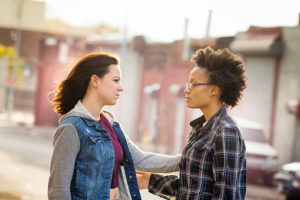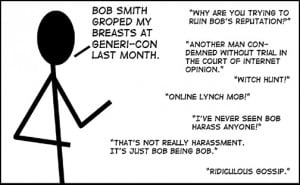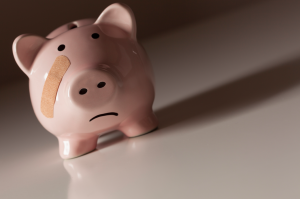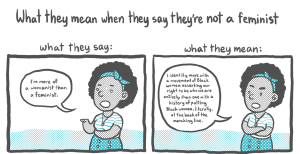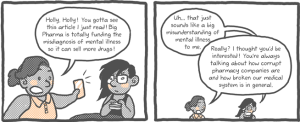
Two people walking with a pride flag.
This article was originally published on The Establishment and republished here with the author’s permission.
I came out as fat to myself about five years ago. I also came out as bisexual to myself around the same time. Both were gradual and mutual processes.
“I think that there is a coming out process around being fat that is rarely discussed,” Dr. Carla Pfeffer, an Assistant Professor of Sociology and Women’s and Gender Studies at the University of South Carolina, wrote in an interview conducted over email. Dr. Pfeffer has done extensive research on the sociological implications of fatness and sexuality.
“People assume that since fatness is so visible, there is no need for fat people to come out as fat,” Dr. Pfeffer added. “But some people view coming out as fat as a way of taking back and reclaiming the discourse around fatness.”
According to sociologists Abigail Saguy and Anna Ward, “coming out as fat involves a person who is easily recognized as fat affirming to herself and others her fatness as a non-negotiable aspect of self, rather than as a temporary state to be remedied through weight loss.”
A fat person admitting to themselves and others that their fatness is a part of their identity rather than something they have to change about themselves can be a radical act of self-love and acceptance. To come out as fat means they are refusing to be a “good fatty.”
Living in a fat body frequently complicates how a person experiences their sexuality and gender expression.
“Because of the hateful and pervasive social messaging around fatness — that it is ugly, unhealthy, disgusting, unclean, and unattractive — many fat people often find it challenging to fully embrace sex and their sexuality,” Dr. Pfeffer said.
Sexual erasure of fat people occurs whether the person in question is heterosexual or homosexual. The erasure becomes more difficult to navigate as the fat person’s sexuality or gender identity becomes more “deviant.”
Gay fat cis men are deemed “feminine” because they are fat, so they suffer double jeopardy from the oppressive notion of “no fats, no fems.”
Lesbian fat cis women must deal with the narrative that they chose lesbianism because their fat bodies make it impossible for any man to ever be attracted to them.
A fat trans person, regardless of sexuality or gender, has to navigate the concept of passing as a fat person, because their fatness transposes gender norms as it is.
“So much of our gender and sexual identities are about our bodies and the ways in which we think about, see, and understand them both in the world and in relation to others’ bodies,” Dr. Pfeffer wrote.
“If you live in a culture that perpetually sends the message that your gender depends on your genitals or chromosomes, or that your body may only be considered healthy, attractive, worthy of care, and desirable if its contours exist within certain narrow metrics or parameters, a natural reaction is to begin to feel disconnected from your body.”
Like being publicly queer or trans, to be publicly and unapologetically fat is a political act. When a person is out as both unapologetically fat and unapologetically queer and/or trans, it requires an enormous amount of emotional labor that many thin, straight, and cis people take for granted.
Between justifying our fat bodies, justifying our queerness, justifying our gender identity and how we express our gender with our fat bodies, fat people within the LGBT community have a lot of factors to contend with when being visible.
Bi, pan, or omnisexual fat queer/trans people are often told their fat body is already excessive. The greed their body personifies tends to be read in their sexuality as well.
On top of fatphobia, transphobia, and homophobia, fat people who do not have a monosexuality must also deal with monosexism, which is also referred to as biphobia. Bisexuality is frequently erased with the narrative that bisexual women are straight women who are “just experimenting.”
Similarly, bisexual men tend to be labeled as gay men who don’t want to come out of the closet. (Interestingly, both of these methods of erasing bisexuality have the bisexual person in question actually liking men all along.)
During Pride, the idea of being visibly queer is on the minds of anyone who identifies as such. In the wake of the Orlando Pulse mass shooting, people within the queer community tried to figure out how to process the implication of this hate crime.
What is involved when a queer or trans person insists on being visible? Coming out as queer or trans is a political act. To come out means that a trans or queer person is insisting on being visible in a heteronormative society that wishes to erase their sexuality and gender identity. To define it simply, coming out is the refusal to pass as straight and/or cisgender.
Having to defend oneself and one’s identity constantly is exhausting to the point that I wonder if coming out (as either fat or queer) to everyone I meet is really worth it.
Does this mean I’m ashamed of who I am? No. It means I value my self-care.
And in the immediate aftermath of a vicious hate crime against people in the LGBT community — specifically those in our community who are people of color — as well as the long history of violence against queer and trans people, it can also be an act of self-preservation.
Fatphobia kills people. It kills people through irresponsible medical care. It kills people through eating disorders. It kills people through suicide.
Homophobia and transphobia kill people. They kill people through violent hate crimes. They kill people through homelessness and displacement. They kill people through suicide.
These forms of oppression cannot be ignored, especially when they coexist. For fat queer people, our queerness is intrinsically linked to our fatness because of how our bodies are perceived.
Acknowledging the additional risks of coming out as both fat and queer is a necessary step toward providing us with the resources, support, and inclusion we need.
[do_widget id=’text-101′]
Charlotte Morabito is a recent college graduate with bachelors degrees in Journalism and Media Studies and Women’s and Gender Studies. She is trying to figure out her next step post-grad by writing through uncertainty. You can find her latest musings at her website and her tweets at @MorabitoCM.
Search our 3000+ articles!
Read our articles about:
Our online racial justice training
Used by hundreds of universities, non-profits, and businesses.
Click to learn more
Most Read Articles
- « Previous
- 1
- …
- 30
- 31
- 32





